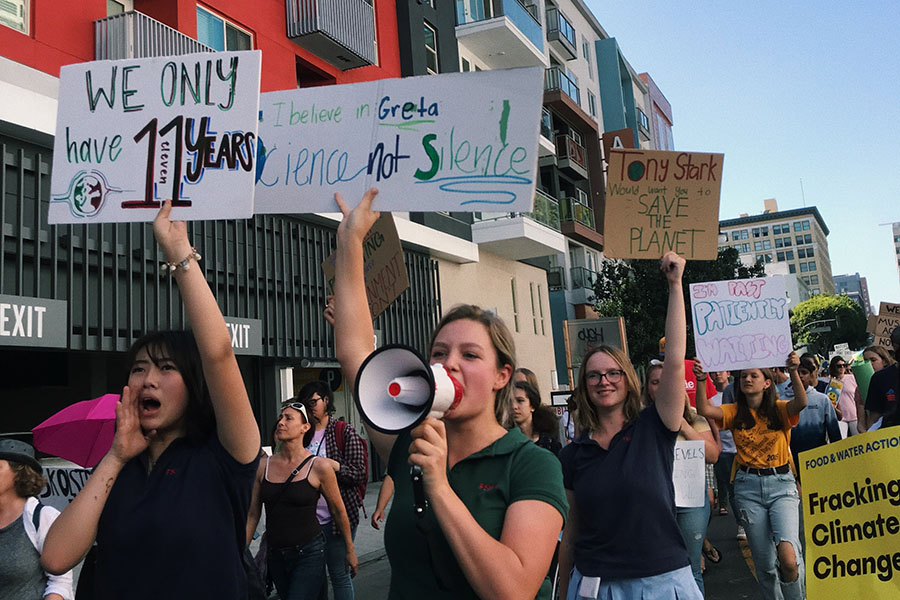Liberals need to unite
Ava Zhang ’23, Macey Lyn Lillard ’23 and Meghan Sullivan ’20 come together to demonstrate their care for the environment.
Pink knitted hats, trigger warnings, safe spaces, Buzzfeed videos, white guilt: I grew up in Studio City, which is a liberal bubble. At my previous school, they recently started Drag Queen Story Hour (where drag queens come and read stories to fourth-graders), and they also started calling the chapel on campus “Community,” because they felt that simply calling the building by what it is, a chapel, was not facilitating “a space where all members feel safe and appreciated.”
I consider myself a liberal. The word “liberal,” though, in certain conservative spheres, has become not only dirty but laughable, with personalities like Ben Shapiro and Steven Crowder becoming famous for, according to YouTube commenters, “destroying, shredding, owning, crushing, annihilating and dismantling” stupid liberals for the public’s enjoyment.
At the heart of liberalism as an ideology is empathy. Empathy for minorities. Empathy for women. Empathy for the fellow person. The goal of frequently criticized liberal “political correctness” is to root out problematic social norms from our speech and thereby change those norms. Just because people no longer think your racist Thanksgiving dinner jokes are funny, Uncle Bob, does not mean your First Amendment rights are being violated. But Republicans love to use PC culture to paint liberals as hypersensitive and push people away from the liberal label.
In the 70s, in the aftermath of the Civil Rights Movement and the Vietnam War, liberalism became concentrated on the coasts and college campuses. To Republicans, liberal became synonymous with elitist. Now, the liberal stereotype has shifted from elitist to extremist, a naive college student touting a “Feel the Bern” shirt, ready to smash open the windows of the local coffee shop and set cars afire if assaulted by the words of a right-wing pundit.
Liberalism is centered around making society work for the biggest number of people, instead of just the wealthy few. This is not easy in a country where people evangelically support trickle-down economics and hail tax cuts as a financial panacea, in a country where we subsidize the oil industry while our climate is going to hell and continue to allow corporate-funded lobbyists to mold the political realm to their favor, in a country where, according to the United States Census Bureau, 8.3 percent of people actively hold more than one job at a time and 27.5 million people live without healthcare.
To solve these pressing issues in the fast-approaching future, liberals will need to establish a strong voter base, because gaining political power is the primary way to implement change.
“Liberalism is going to have to expand its understanding of different demographics in the country. I think the old liberalism, which used to see labor, for instance, as always their constituents, has lost touch with traditionally working-class groups in the middle of the country. They’ve got to find a way to redesign themselves, without sacrificing their values, to appeal to those groups again,” Ms. Holly Hunnewell, English teacher and moderator of Feminists in Action, said.
If liberal votes are not unified, then liberalism’s political power will be diminished. Gathering people to march is one thing, but getting people to vote is another.
“We need civil protest. We need the Women’s March, people out on the streets. But it’s not enough to stop there,” Steve Pierson, host of the progressive political podcast “How We Win,” told me in a phone interview.
It can feel like today’s liberalism is promoting a world with no gray area. For liberals and conservatives alike, this can be off-putting. You either are woke, or you are ignorant. You cannot speak to a cause unless you belong to the identity that it concerns. You only started supporting gay marriage 20 years ago? Well, too bad. You are a homophobe. You are cancelled.
“To me, if someone can evolve, that’s important. Don’t we want to celebrate evolution?” Hunnewell said.
At the bottom of most stereotypes is some kind of observable truth. While liberalism, like all other political factions, has its extreme divisions, most liberals do not fall into this category. Liberals will have to band together, instead of dividing the move for equality into different cliques. The more divided we get, the less power we have.
“I think it’s splintering in a way that can never create consensus if people fall off into these very tightly defined groups of support,” Hunnewell said.
Popularity is not an issue for liberals. In fact, many young people identify with liberal causes.
“For liberals, demography is destiny. Younger people, people under 30, are like 70 percent democratic. Virginia has gone in 15 years from being a solid red state to a very solid blue state,” US history and economics teacher Mr. Mike Thornton said.
Extreme division, though, will undermine liberalism even if liberals are a majority. Being a Bernie lover, for example, shouldn’t stop you from voting for Elizabeth Warren if she gets the party’s nomination. Stereotypes meant to degrade liberalism’s popularity are not insignificant, but what is ultimately more concerning is the prospect of liberalism tearing itself apart from the inside. In the future, we must put these real world issues in front of our personal desires to make real change.

Ella Kitt is the editor-in-chief. She joined the Veritas Shield writing staff as a sophomore in 2018 and served as the managing editor her junior year....


